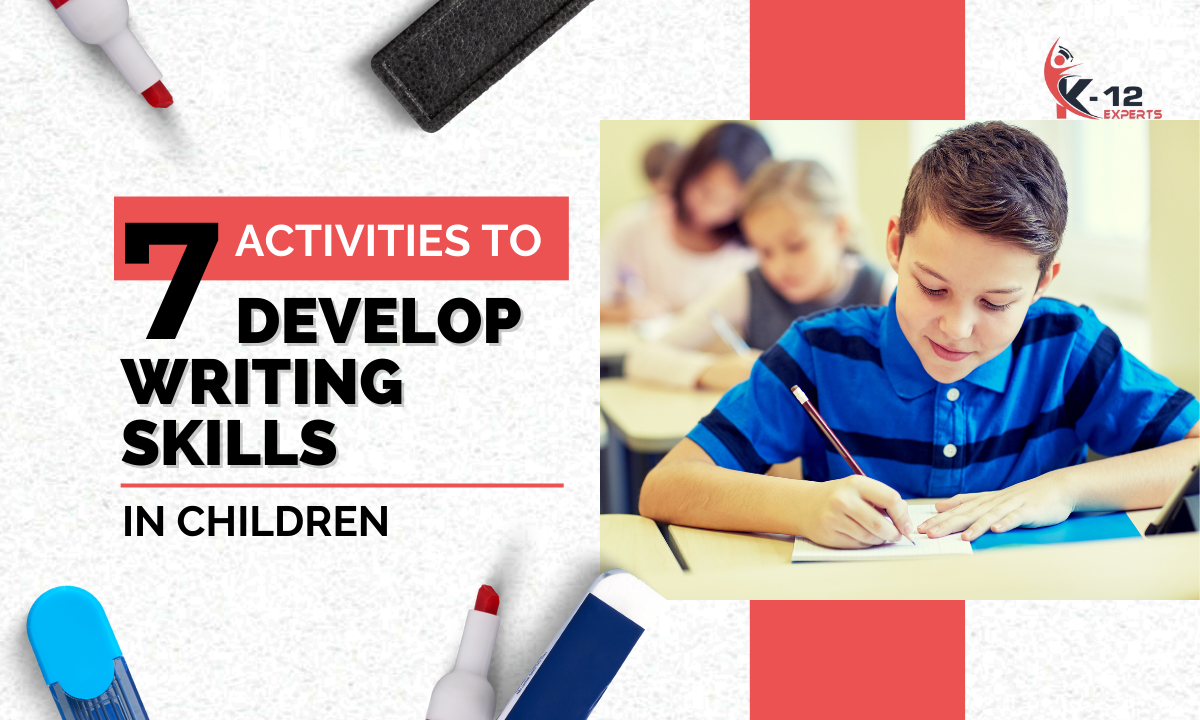Developing writing skills in children is a crucial component of their overall educational advancement. It fosters creativity, enhances communication abilities, and promotes critical thinking.
However, ensuring that the acquisition of this skill is engaging and enjoyable for children can be challenging.
This article proposes seven innovative activities designed to cultivate these competencies intriguingly.
These activities range from Story Dice and Journal Writing to Collaborative Story Writing, Book Reports, Word Games such as Scrabble and Crosswords, Letter Writing, and Poetry Creation.
Each activity provides a unique approach that targets different aspects of writing and presents them in a way that children find entertaining yet informative.
Key Takeaways
- The development of writing skills in children is crucial for educational advancement.
- Writing skills foster creativity, enhance communication abilities, and promote critical thinking.
- Ensuring that the acquisition of writing skills is engaging and enjoyable for children can be challenging.
- The article proposes seven innovative activities to cultivate writing skills in children: Story Dice, Journal Writing, Collaborative Story Writing, and Book Reports.
Activity 1: Story Dice
Story Dice is an innovative and interactive activity designed to cultivate writing skills in children by encouraging them to create stories based on the images shown on the dice.
Its benefits are multifaceted, fostering creative thinking, enhancing vocabulary, and promoting narrative comprehension.
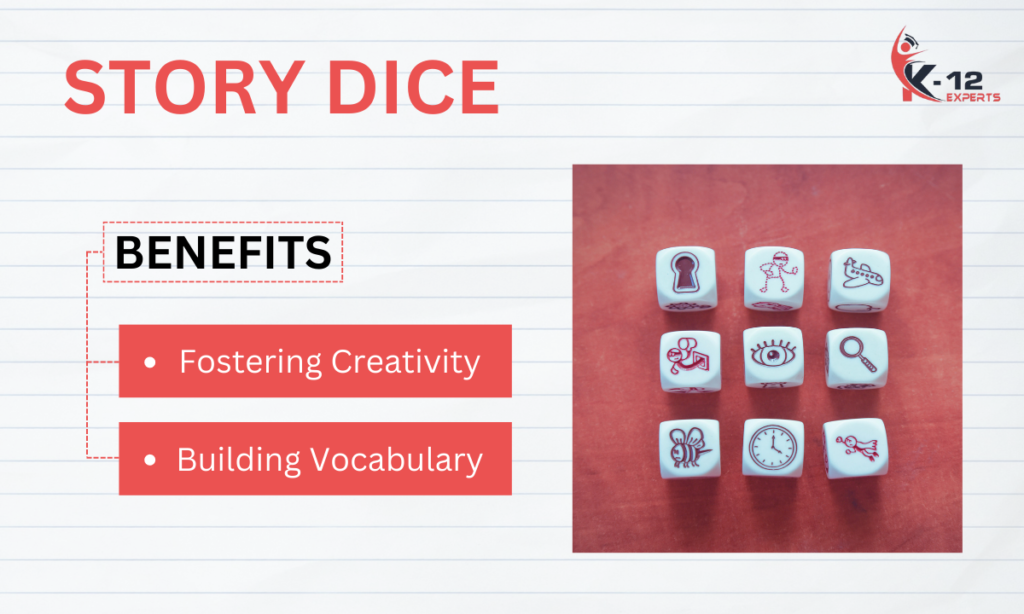
Explanation of the Activity
Engaging in regular journaling activities can profoundly impact children’s writing skills, providing them with an outlet to freely express their thoughts and ideas.
‘Story Dice’ is one such activity that combines elements of digital storytelling, role-play writing, and picture prompts to create a unique learning experience.
The child rolls the dice to determine the storyline for their writing task.
| Activity | Effect | |
| 1 | Digital Storytelling | Enhances creativity; Promotes critical thinking |
| 2 | Role Play Writing | Fosters empathy; Encourages perspective-taking |
| 3 | Picture Prompts | Stimulates imagination; Strengthens visual literacy |
This makes the process fun and engaging and challenges them to think creatively about how different elements can fit together in a narrative.
Benefits of Story Dice
Story Dice, an intriguing educational tool, provides a significant advantage in fostering creativity and building vocabulary among children.
Engaging learners in the spontaneous generation of narratives based on randomized dice symbols cultivate imaginative thinking and storytelling skills.
Fostering Creativity
Creativity can be promoted in children’s writing activities by inviting them to explore imaginative scenarios, encouraging vivid descriptions, and integrating different perspectives.
Strategies include:
- Engaging in creative brainstorming sessions.
- Incorporating imaginative play into writing tasks.
- Using art-inspired writing prompts.
- Encouraging experimentation with various literary techniques.
- Allowing free expression without fear of mistakes.
These methods stimulate their creativity, enhancing their writing skills drastically.
Building Vocabulary
Expanding a learner’s vocabulary is integral to their linguistic growth and can be accomplished through various methods.
Synonym Exploration, for instance, broadens word comprehension and encourages versatile expression.
Pictorial Dictionaries aid in associating images with words, enhancing memory retention.
Tips for Effective Implementation
Implementing these activities effectively requires careful planning, consistent practice, and a supportive environment that fosters creativity and expression.
For successful execution, incorporating technology into the learning process can stimulate interest and engagement in children.
Interactive writing tools and applications enjoyably encourage the exploration of vocabulary.
Parental involvement is another crucial element for effectiveness. Parents providing positive feedback on written works will boost children’s confidence and motivation to write more often.
Activity 2: Journal Writing
Journal writing, an activity that involves children chronicling their thoughts, feelings, and experiences regularly in a dedicated notebook, offers several benefits, such as enhancing writing skills, promoting self-expression, and improving cognitive abilities.
This habit fosters creativity and helps children articulate their emotions more effectively while enabling them to understand complex topics better.
To ensure consistent practice, it may be beneficial to establish a regular schedule for journaling, provide prompts when necessary, and create a conducive environment that encourages reflective thinking.
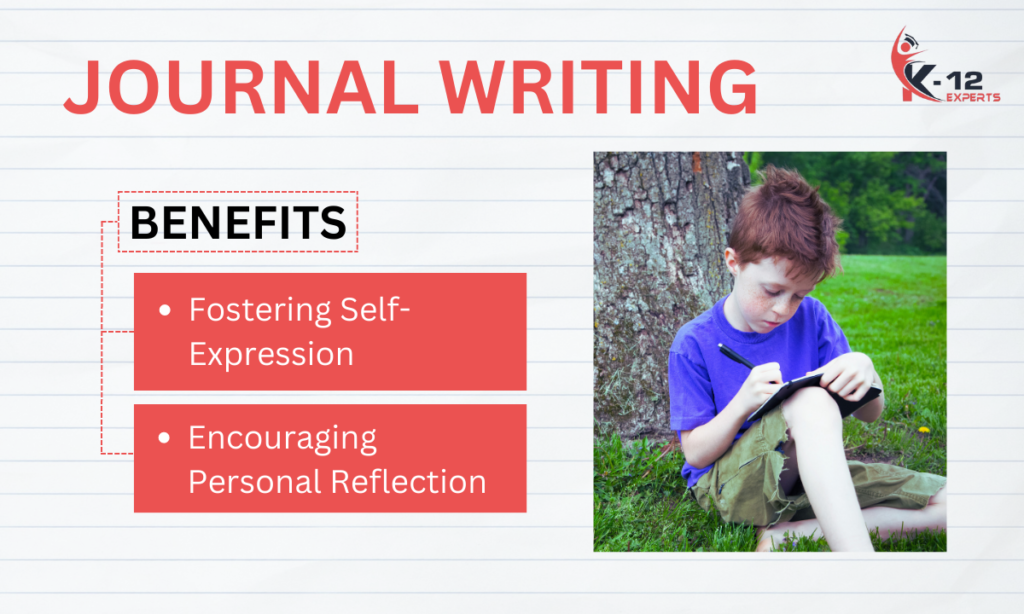
Explanation of the Activity
Integrating storytelling in the learning process enhances creativity and significantly improves children’s writing skills.
The journal writing activity can be enriched with role-play writing, flash fiction, and comic strips.
Role play encourages creative thinking and allows children to explore diverse perspectives while enhancing their narrative abilities.
Flash fiction, on the other hand, challenges them to convey a complete story in limited words, thus honing their conciseness and precision.
Comic Strips combine textual communication with visual elements that stimulate logical reasoning and aesthetic sense.
| Emotional Response | Description |
| Empowerment | Children learn to express themselves effectively. |
| Joy | Creativity used in storytelling brings fun into learning. |
| Confidence | Mastering new forms of writing builds self-esteem. |
| Curiosity | Different storytelling formats spark interest. |
| Achievement | Completing a unique piece of work gives a sense of accomplishment. |
This dynamic approach makes writing an exciting adventure rather than a tedious task.
Benefits of Journal Writing
Journal writing holds significant potential in promoting self-expression and personal reflection among children, two critical aspects of their holistic development.
It provides a platform for these young minds to articulate their thoughts, feelings, aspirations, challenges, and experiences freely without fear of judgment or ridicule.
Fostering Self-Expression
Encouraging children to express themselves through creative writing can significantly enhance their ability to communicate and articulate thoughts effectively.
Emotional awareness is heightened by fostering an environment that values artistic expression, further enriching their narrative skills.
Through visual storytelling techniques, children learn to create vivid images with words, thereby developing a more profound understanding of the power and potential of written language.
Encouraging Personal Reflection
Moving beyond self-expression, developing writing skills can also be enhanced by encouraging personal reflection in children. This process allows them to delve deeper into their thoughts and feelings, fostering cognitive growth.
- Introducing Reflective games that stimulate introspection.
- Utilizing Mind mapping techniques to structure thoughts.
- Encouraging Emotional literacy for understanding emotions.
- Implementing journal activities for self-reflection.
- Promoting creative writing to express personal experiences.
Tips for Encouraging Regular Practice
Regular practice in writing can significantly enhance a child’s ability, and there are numerous strategies to motivate this habit.
One such strategy is rewarding consistency, which involves appreciating the effort made by children to write regularly.
This recognition can take various forms, from verbal praise to tangible rewards, thus stimulating their interest in writing.
Formulating practice schedules can also be instrumental in establishing a routine for children.
These organized timetables provide structure and foster discipline, which is crucial for honing any skill.
Activity 3: Collaborative Story Writing
Collaborative story writing is an engaging activity that involves a group of individuals working together to create a unified piece of fiction.
It fosters creativity and teamwork and enhances communication skills, requiring participants to discuss, negotiate and compromise on the plot, characters, and other narrative aspects.
To facilitate successful sessions, it is vital to establish clear guidelines at the onset, encourage equal participation from all members and foster a supportive environment that values each contribution.
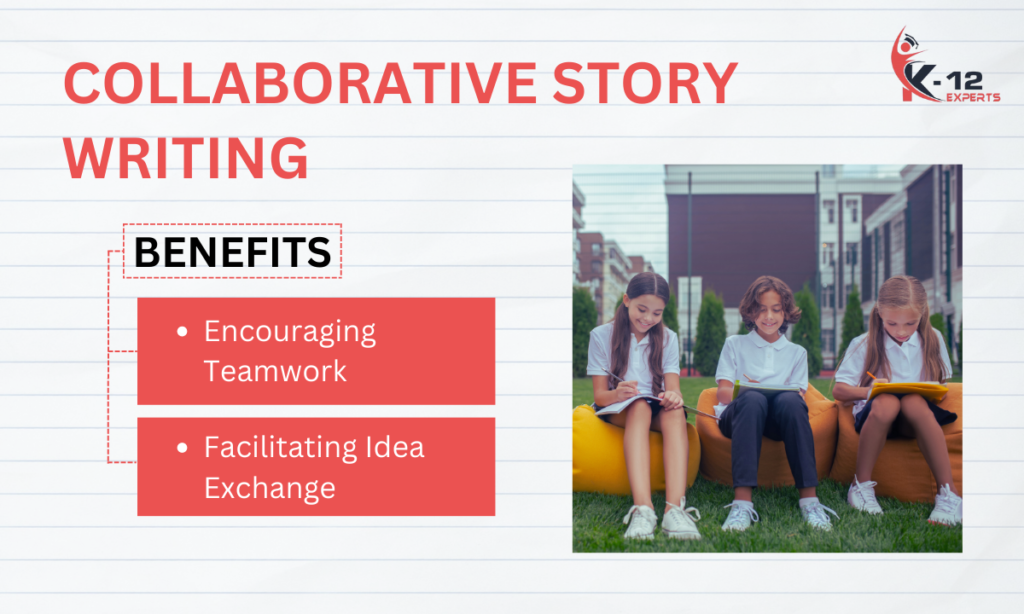
Explanation of the Activity
Creative writing exercises can significantly enhance children’s writing skills, encouraging them to express their thoughts and ideas more effectively.
Collaborative story writing is one such activity that combines creativity with teamwork, stimulating a child’s imaginative thinking while practicing essential writing techniques.
This activity entails:
- Role playwriting: Children collaboratively create characters and scenarios, then write from their character’s perspective.
- Digital storytelling: Children work together to create a narrative filled with descriptions and dialogue using digital tools.
- Comic strip creation: The group designs a comic strip where each child contributes by adding text to the panels.
- Editing and Proofreading: As part of the process, children review each other’s contributions, fostering critical reading skills alongside written expression.
Benefits of Collaborative Writing
Collaborative writing, particularly as a tool to enhance children’s writing skills, holds substantial merit in two pivotal domains: fostering teamwork and enabling the exchange of ideas.
In instilling the ethos of cooperation and shared responsibility, collaborative writing activities enable children to appreciate the value of collective effort toward achieving common goals.
Encouraging Teamwork
Fostering a sense of teamwork in writing tasks can exponentially enhance children’s ability to communicate effectively and express their ideas with clarity.
Team bonding exercises, such as role-play scenarios, can promote mutual understanding and inspire creativity.
Facilitating Idea Exchange
Promoting a culture of open dialogue and idea exchange significantly elevates creativity and broadens perspectives, enhancing the quality of written work.
Implementing brainstorming sessions facilitates this process, allowing children to generate innovative ideas.
Tips for Facilitating Successful Sessions
Ensuring effective sessions that bolster children’s writing skills necessitates strategic planning, creativity, and a supportive environment.
The first step is comprehensive session preparation. This encompasses devising engaging, age-appropriate activities that cater to the diverse needs of the children. Various tasks such as story creation, sentence structuring exercises, or journal entries can ignite children’s imagination and induce a passion for writing.
Motivational techniques are also pivotal in facilitating successful sessions. They can range from verbal praise for effort to tangible rewards for progress.
The aim is not just to teach but inspire enthusiasm for written expression among young learners, thereby paving the way for them to become confident writers in future academic pursuits.
Activity 4: Book Report
The fourth activity, the Book Report, involves a detailed analysis and summary of a book to enhance children’s comprehension and critical thinking abilities.
This exercise offers notable benefits such as boosting vocabulary, improving communication skills, fostering a deeper understanding of literature’s structure, and nurturing an appreciation for diverse genres.
Essential guidelines to assist children in this task include providing clear instructions about what the report should encompass, encouraging them to annotate while reading for efficient recall of information and facilitating discussions that stimulate their perspectives on the book’s themes.
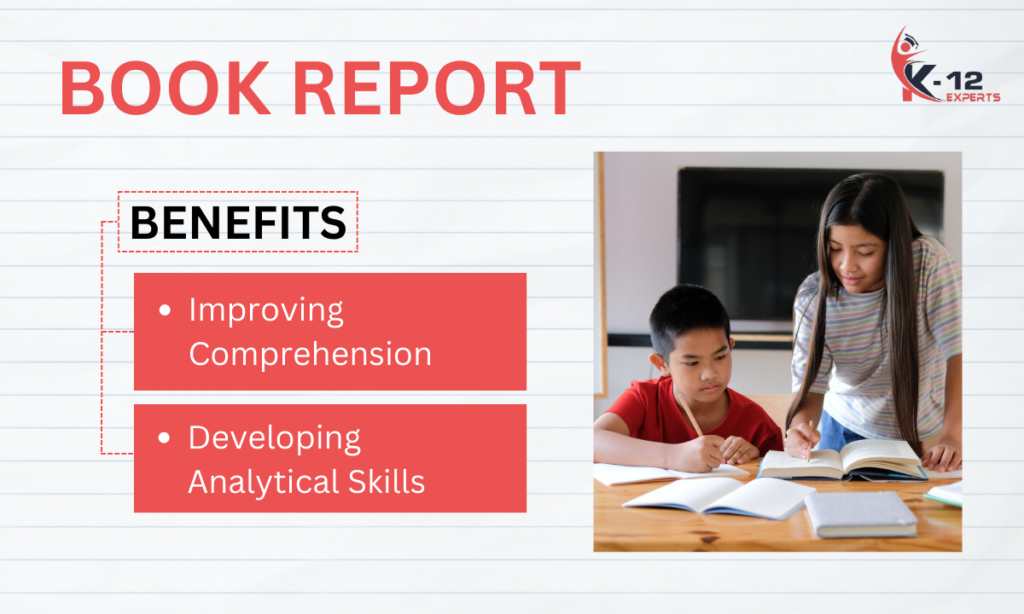
Explanation of the Activity
Engaging children in diverse and enjoyable writing activities can significantly enhance their abilities, offering them a creative outlet to express themselves while simultaneously honing their linguistic skills.
One such activity is the Book Report, which encourages children to delve into the world of literature and articulate their understanding.
- Engaging Illustrations: Children are asked to create illustrations that depict key events or characters from the book. This visual representation aids in comprehension and stimulates creativity.
- Digital Platforms: Utilizing digital platforms for presenting book reports adds a contemporary approach to learning. It also fosters computer literacy.
- Language Games: Post-report language games based on the book reinforce vocabulary learned and foster enjoyment in language use.
Benefits of Writing a Book Report
The practice of writing book reports presents a multitude of advantages for children, particularly in enhancing comprehension and fostering analytical skills.
Children can significantly improve their understanding and retention of the material read by delving into literature and articulating its content.
Meanwhile, the task requires them to meticulously dissect the plot, characters, and themes, thereby cultivating a robust foundation in critical thinking and analysis.
Improving Comprehension
Building comprehension skills in children can be an effective strategy to enhance their writing abilities. Reading strategies, text analysis, and critical thinking can significantly improve comprehension, thus bolstering their writing prowess.
| Reading Strategies | Benefit |
| Predicting | Enhances understanding |
| Summarizing | Encourages conciseness |
| Text Analysis Techniques | Benefit |
| Identifying main ideas | Fosters clarity |
| Inferring meaning from context clues | Promotes critical thinking |
Developing Analytical Skills
Cultivating analytical abilities in young learners can profoundly augment their capacity to dissect, comprehend, and evaluate information, thereby enriching their academic performance.
Children can develop problem-solving skills crucial for strong writing through analyzing texts and critical reading exercises.
This process enhances comprehension and fosters a deep understanding of content, enabling the learner to distill complex ideas into clear, concise prose.
Tips for Guiding Children
Encouraging creativity and providing constructive feedback is central to guiding children in developing writing skills.
Parental involvement can play a significant role in this process, fostering an environment conducive to learning and growth.
The home environment should be designed to stimulate intellectual curiosity, offering resources such as books and writing materials that enhance the child’s literacy journey.
Implementing motivational strategies is equally important; these could include positive reinforcement techniques or setting achievable goals for the child.
For instance, parents can reward progress with praise or small incentives.
Activity 5: Word Games (Scrabble, Crosswords)
As an engaging educational activity, word games such as Scrabble and Crosswords foster vocabulary expansion and enhance children’s cognitive abilities.
The benefits of these games extend beyond pure amusement, promoting critical thinking skills, improving memory and concentration, and encouraging strategic planning.
To effectively incorporate word games into a learning environment, it is crucial to select age-appropriate challenges, provide clear instructions for gameplay, and create a competitive yet supportive atmosphere that motivates learners to excel.
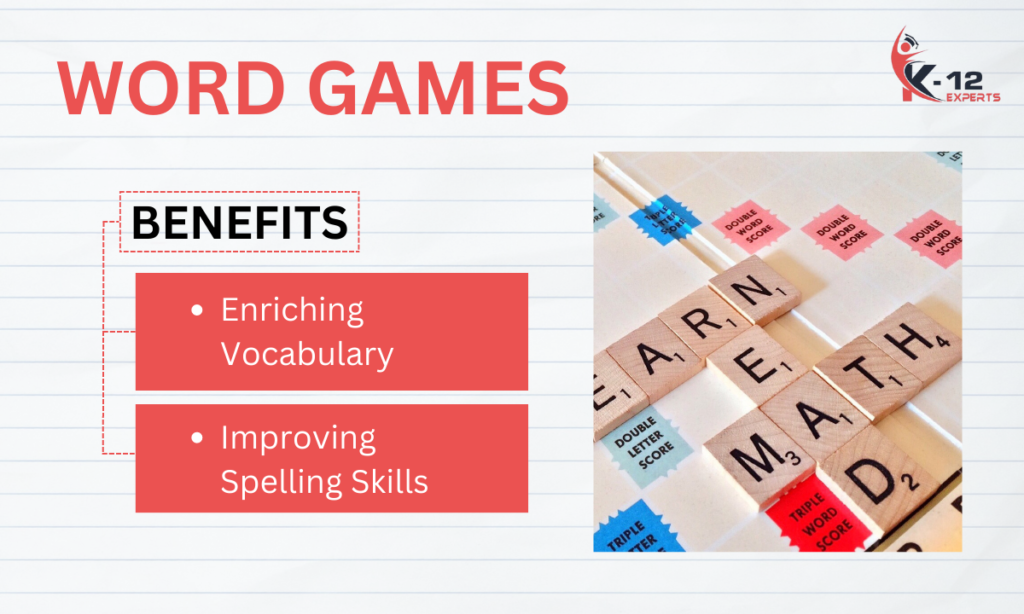
Explanation of the Activity
Implementing engaging and interactive activities can significantly enhance a child’s writing ability by developing their creativity, language skills, and comprehension.
Utilizing word games such as Scrabble and Crosswords serves this purpose effectively.
These games boost the child’s vocabulary while providing an enjoyable learning experience.
- Reading Habits: Word games encourage children to read regularly, enhancing their vocabulary.
- Educational Toys: Games like Scrabble are educational toys that make learning fun.
- Parental Involvement: Such activities allow parents to participate in their child’s learning process.
- Cognitive Development: Word games stimulate a child’s brain, improving their cognitive abilities.
- Creativity Boost: These activities inspire children to think creatively when forming words or solving puzzles. Consequently, these practices foster improved writing skills over time.
Benefits of Word Games
The exploration of word games presents a potent avenue for enhancing children’s writing skills, particularly vocabulary enrichment and spelling proficiency.
These engaging activities provide a platform for expanding linguistic repositories, fostering an environment conducive to effective communication and enhanced comprehension.
Enriching Vocabulary
Expanding a child’s lexicon can significantly enhance their writing abilities, fostering creativity and improving their ability to articulate thoughts effectively.
Utilizing vocabulary apps can engagingly introduce new words. Thesaurus usage encourages the exploration of synonyms, enriching language diversity.
Furthermore, word association games stimulate cognitive connections between words, bolstering memory retention.
These methods collectively contribute to vocabulary enrichment and better writing skills.
Improving Spelling Skills
Transitioning from vocabulary enhancement, the focus shifts to refining spelling skills, a crucial aspect of writing proficiency.
Four effective strategies include:
- Encouraging participation in Spelling Bee Competitions.
- Utilizing Interactive Software Learning for Practice.
- Incorporating Phonics Instruction to understand word formation.
- Regular spelling tests for reinforcement.
Tips for Incorporating Word Games
Engaging young minds with word games can profoundly enhance their writing skills, offering a fun and interactive avenue to explore the vast landscape of language.
Integrating Digital Literacy into these activities is crucial; children become familiar with technology while improving their linguistic abilities.
Game Modifications are significant; tailoring games to fit individual learning styles ensures optimal engagement and better knowledge absorption.
Parental involvement plays a pivotal role in this development process. Parents who actively participate in these games provide additional motivation for children and reinforce the learning experience at home.
Activity 6: Letter Writing
As an educational activity, the practice of Letter Writing involves the composition of written communication and facilitates a comprehensive understanding of language.
This exercise offers manifold benefits, such as enhancing vocabulary, improving grammar, fostering creativity, promoting critical thinking skills, and providing a platform for expression.
To ensure students remain engaged throughout this task, educators can introduce various themes for letters or include real-life scenarios to make it more interactive and enthralling.
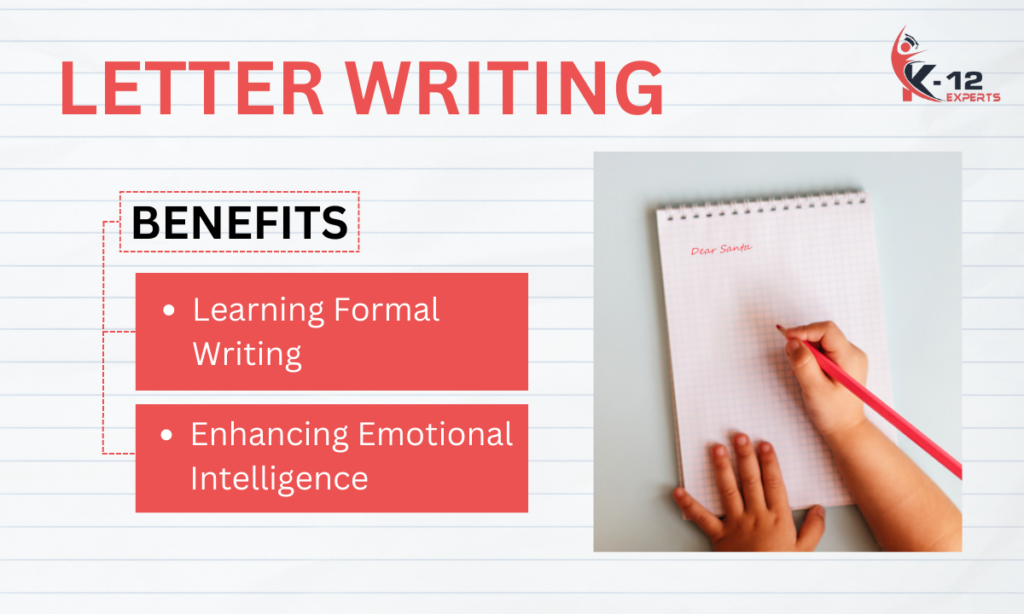
Explanation of the Activity
Incorporating creative writing activities into a child’s routine can significantly enhance their ability to express thoughts, ideas, and emotions more effectively and accurately.
This is particularly evident in the activity of letter writing. The process necessitates engaging with creative drawing exercises that stimulate imagination, enriching written content.
Simultaneously, role-playing activities encourage children to adopt varied perspectives, which add depth and complexity to their compositions.
Benefits of Letter Writing
Letter writing offers many benefits, particularly in children’s development.
It not only instills the skill of formal writing – an essential tool for effective communication across diverse professional and academic platforms – but also fosters emotional intelligence by encouraging self-expression and thoughtfulness.
Thus, This multidimensional activity holds significant potential as an educational tool, fostering cognitive and emotional growth in young learners.
Learning Formal Writing
Mastering formal writing equips young learners with a profound skill set, fostering intellectual growth and empowering them to communicate ideas effectively across various professional settings.
- Email Etiquette: Enhances effective, professional online communication.
- Academic Essays: Builds ability to articulate thoughts in structured forms.
- Business Correspondence: Fosters an understanding of corporate communication styles.
- Grammar Mastery: Ensures correct use of language, boosting confidence and credibility.
Enhancing Emotional Intelligence
Cultivating emotional intelligence, a paramount facet of personal growth and successful social interaction equips individuals to understand and manage their emotions and those of others.
Emotional storytelling, empathy training, and feelings identification are core activities that foster this development in children.
| Emotional Storytelling | Empathy Training |
| Inspires imagination | Enhances understanding of others’ feelings |
| Aids in expressing emotions | Fosters compassion |
Making Letter Writing Engaging
Transforming the seemingly mundane task of letter writing into an exciting and engaging activity can ignite children’s interest and significantly improve their writing skills.
This can be achieved by incorporating Pen Pal Programs, Postal System Education, and Historical Letter Analysis.
Pen Pal Programs create a real-world context for writing, fostering genuine communication with peers across different geographical locations. Children not only practice grammar and spelling but also learn about diverse cultures.
Postal System Education provides a practical understanding of how letters are processed and delivered. It instills respect for this traditional means of communication and enhances patience in waiting for responses.
Historical Letter Analysis develops critical thinking by studying past correspondence. It offers insights into historical events while enhancing comprehension skills.
Activity 7: Poetry Creation
Poetry Creation involves guiding children to express their thoughts, feelings, and experiences through verse, fostering the exploration of language creatively and imaginatively.
This exercise offers manifold benefits, such as enhancing vocabulary, improving linguistic skills, stimulating creativity, and promoting self-expression and emotional health.
Given the substantial merits of poetry writing, it is imperative to encourage children’s participation by creating a supportive environment that kindles their interest and nurtures their innate talent for this literary form.
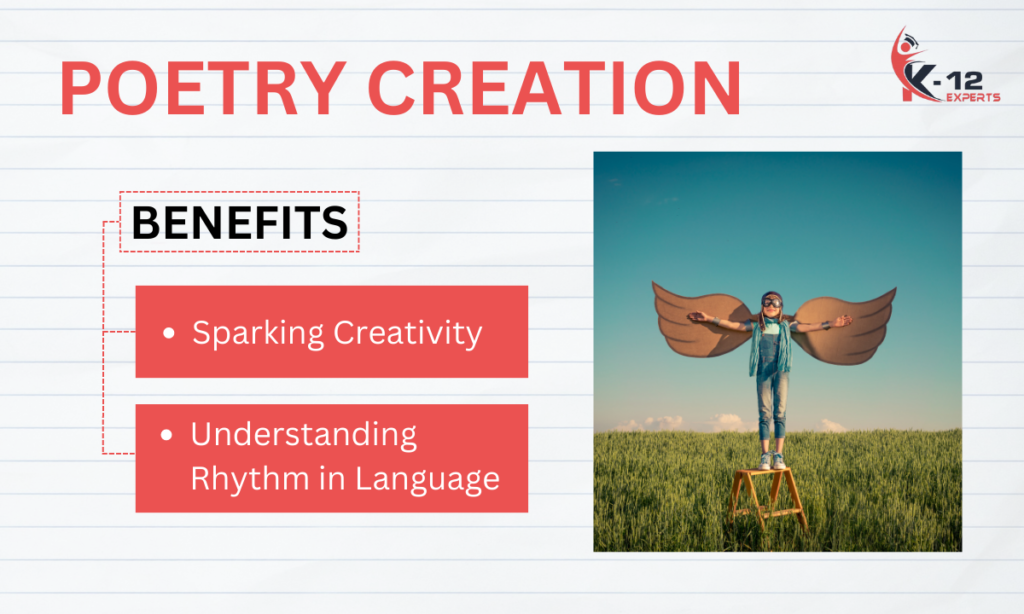
Explanation of the Activity
Engaging in various writing activities can enhance children’s creative and analytical abilities, paving the way for academic excellence and improved communication skills.
Among these activities, poetry creation is a significant tool to foster creativity and analytical thinking. This activity involves generating visual storytelling through words which helps children understand the impact of literary techniques on conveying emotions and messages.
Leveraging digital narratives allows learners to experiment with different themes, styles, and perspectives within their creations.
Such an innovative approach fosters learner motivation by allowing them to own their work.
Consequently, they learn to express themselves more effectively while honing their critical thinking skills.
Poetry creation is a practical yet exciting activity that enhances children’s writing capabilities.
Benefits of Poetry Creation
Exploring the realm of poetry creation offers many benefits in developing writing skills among children, particularly in sparking creativity and understanding rhythm in language.
The imaginative nature of crafting poems galvanizes the inherent creative impulses of young minds, encouraging them to delve into their inner thoughts and emotions while creating unique narratives.
Sparking Creativity
Unleashing the boundless imagination within each child often serves as a powerful catalyst for enhancing their writing skills.
Creative brainstorming, imaginative play, and artistic inspiration are key to spark creativity. These activities not only foster original ideas but also improve written expression.
| Creative Brainstorming | Imaginative Play |
| Encourages flexible thinking | Stimulates mental growth |
| Promotes problem-solving skills | Enhances social interaction |
Understanding Rhythm in Language
Having explored how to ignite creativity, it is essential to delve into the role of rhythm in language. Grasping rhythm recognition can enhance children’s writing skills significantly.
- Understanding Language Musicality.
- It cultivates a sense of flow and coherence.
- Enhances stylistic expression.
- Emphasizing Syllable Counting.
- Helps refine word usage and sentence structure.
- Aids in creating rhythmic phrases.
Encouraging Children to Write Poetry
Cultivating a love for poetry in children can significantly enhance their writing skills and foster creativity.
This artistic expression allows them to explore rhymes, adopt various poetry themes, and constructively unleash their emotions on paper.
The role of rhyming words in poetry helps young learners understand the rhythm of language, improving their phonemic awareness.
Experimentation with diverse poetic themes broadens children’s perspectives, sparking curiosity about different cultures, nature, or contemporary issues.
Frequently Asked Questions
What are some other activities not listed here that can also help to develop writing skills in children?
Encouraging reading contributes significantly to writing skill development, expanding vocabulary, and enhancing creative storytelling abilities.
This approach fosters comprehension and expression, yielding marked progress in children’s written communication proficiency.
How can technology or digital tools be incorporated into these activities to make them more engaging for children?
Incorporating digital storytelling, gamified writing, and interactive journals can enhance children’s engagement in writing activities.
These digital tools offer dynamic, interactive experiences that stimulate creativity and foster skill development.
What are some ways to motivate children who are reluctant or struggling to write?
Motivating hesitant child writers may involve peer review encouragement, fostering a cooperative learning environment.
Implementing creative writing prompts stimulates imagination, while fun writing competitions can spark competitive spirit and enhance skill development.
How can parents or educators assess the progress of children’s writing skills development?
Progress tracking, peer evaluation, and self-assessment techniques are instrumental in assessing children’s writing skills development.
Regular written task monitoring, peer feedback, and individual self-evaluation effectively gauge improving writing abilities.
Can these activities be adapted for children with learning disabilities or special needs?
Inclusive techniques can ensure adapted activities for children with learning disabilities.
A special needs approach promotes tailored modifications, facilitating the adaptation of writing skill development tasks to accommodate diverse learning capabilities effectively.
Conclusion
In conclusion, these seven activities offer an engaging and diverse approach to developing writing skills in children.
By incorporating creativity, critical thinking, structure, and collaboration, a comprehensive skill set is fostered that extends beyond mere proficiency.
It has been demonstrated that such multifaceted learning methods contribute significantly to children’s cognitive growth and academic achievement.

